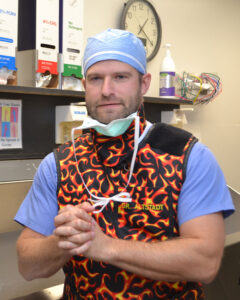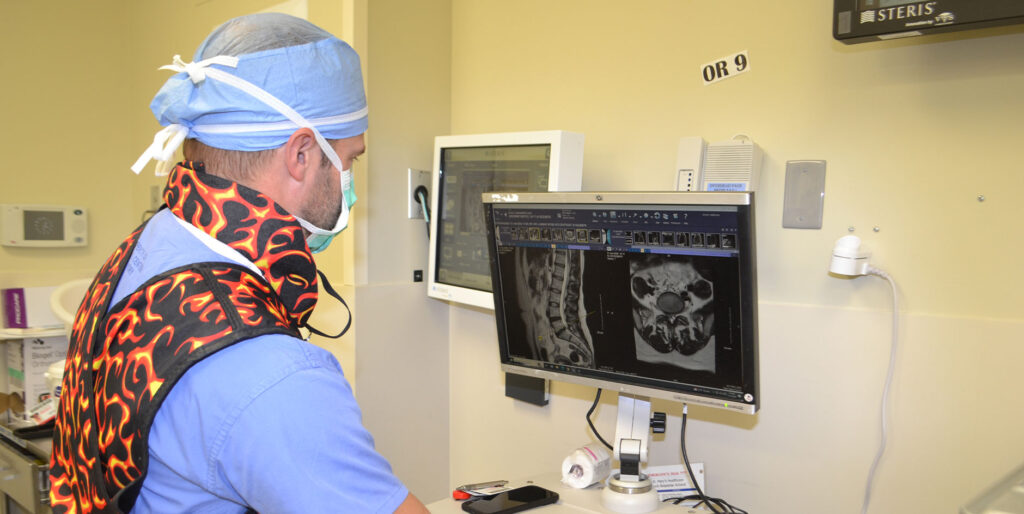David Freeman, MD, PhD, performs endoscopic spine surgery to restore patients’ quality of life at UofL Health
LOUISVILLE “Spine-tingling” is generally used to describe a movie, book, or event. It means exciting and thrilling, but also frightening. It represents a heightened state of alertness and sensitivity and is reflective of the vital role of the spine in human anatomy.
Anyone with chronic back pain or leg pain can speak to the importance of good spinal health. So can David Freeman, MD, PhD, director of endoscopic spine surgery at UofL Health.
“There is a misconception that if you need spine surgery, life is over and that you’re always going to have back pain or you’re going to need more surgery,” says Freeman, who is also an assistant professor of neurosurgery at the University of Louisville School of Medicine. “Spine surgery done for the right reasons, in the right patients, is an incredibly powerful tool that can give people their lives back.”
He recalls a recent case in which a patient had atlanto-occipital dislocation (AOD), a condition when the head is no longer connected to the neck.
“This lady had not had any significant trauma. This type of injury is most common in high-speed car accidents, but she had not had that,” Freeman says. “We stabilized her temporarily in a halo, an advanced neck brace, and we took her to surgery the next day. We put a plate on the back of her head, screws in the top of her neck, and connected them all. Everything went well. She had strength and dexterity back within five days, which was remarkable. If we had not intervened, she would have been a quadriplegic and would have needed a ventilator to help her breathe for the rest of her life.”
While that was an extreme case, it reflects why Freeman chose neurosurgery in the first place. After graduating from Augustana College in Illinois, the Chicago-area native attended medical school at the Loyola University of Chicago Stritch School of Medicine. For his PhD, he studied neurodegenerative diseases such as Parkinson’s disease.
The Road to Louisville
Freeman was well on his way to becoming a neurologist until he found that neurosurgery was more appealing.
“I was very fortunate that one of the cases that I saw as a medical student in neurosurgery was a rare, bony septum that was sticking into a patient’s spine. We were able to remove that and, in the recovery area, she had significant immediate relief of her pain,” says Freeman. “It was sort of a landmark experience for me that made me want to continue down that path to neurosurgery.”
Freeman interned in neurosurgery at the University of Minnesota, where he also completed a neurosurgery residency. In 2023, he completed a minimally invasive spine fellow ship at the University of Miami before joining UofL Health in Louisville.
“I was looking for a place that was interested in developing endoscopic spine surgery,” Freeman says. “I wanted to be able to teach residents and have a focus on some research as well. UofL Health has all of those things.”
Know the Patient First, Then Treatment
A typical week for Freeman involves surgery on Mondays and Wednesdays and seeing patients in clinic on Tuesdays and Thursdays, while Fridays include research and administrative tasks. His typical spine patients are middle-aged or older, presenting with back, neck, arm, or leg pain.
“It spans the spectrum of clinical care because I get to take care of some patients in acute settings while treating others for a degenerative condition,” Freeman says.
In his initial consultation with patients, Freeman focuses on understanding the

patient’s symptoms, and completes a physical exam related to those symptoms. After any imaging is complete, he reviews them with the patient, explaining the problem and the options for treatment.
“That’s how we establish a relationship and build trust,” Freeman says. “I try to be as truthful and frank as I can with the patients about the risk and benefits of surgery, and the risk and benefits of their condition. It is my job to be able to provide clarity and understanding of what the options are, what the risk and benefits are. Ultimately, I do not know what their symptoms feel like, and how they affect them on a daily basis. We need that input in order to make an informed decision together.”
Even though Freeman’s area of expertise is endoscopic spine surgery, it is the last resort for treatment. He often recommends conservative measures first, which may end up treating the symptoms without the need for surgery.
Those who do need surgery benefit from the minimally invasive endoscopic spine surgery, which results in a smaller incision and quicker recovery time.
“Endoscopic spine surgery introduces an endoscope into and around the spine, through which you can view the pathology directly,” Freeman says. “We also have instruments that allow us to do the surgery and take care of the problem there. The incision is usually about a centimeter. Anesthesia time can be significantly less and patients go home typically the same day.”
New Options for Spine Surgery and Recovery
Freeman also utilizes single-position surgery, doing surgery in the lateral position. “I’m interested in trying it and seeing what works for myself and the institution as well as
“If patients say they are feeling better than they were before surgery, that’s tremendously rewarding.” — David Freeman, MD, PhD, director of endoscopic spine surgery, UofL Health
the patients,” Freeman said. “I’m excited to see where that approach goes. It is certainly a powerful approach that could be the most efficient and best type of surgery for certain patients.”
Freeman is also leading an application for institutional research approval for the use of FDA-approved composite beads.
“We can add antibiotics and pain medication to the beads and we can put them in the incision,” says Freeman, who

used the beads during his fellowship. “They dissolve over 45 to 60 days. Using them during my fellowship, we were able to reduce patients’ length of stay in the hospital, reduce the morphine or narcotic usage, and reduce surgical site infections.”
Seeing the result of such significant improvements and advancements is part of what fuels Freeman’s passion for his work. Much like the rewarding story of the patient who recovered from AOD, the success stories, the positive outcomes, and the lives regained are the images and moments that hold a special place in Freeman’s mind and heart.
“If my patients say they are feeling better than they were before surgery, that’s tremendously rewarding. Those are the reasons I do spine surgery,” says Freeman. “I had an endoscopic case I did a couple of months ago. The patient had debilitating leg pain and was not able to golf or even walk. I just saw him for his three-month follow-up and cleared him for a golf tournament. He’s back to walking miles a day. He got his life back.”




